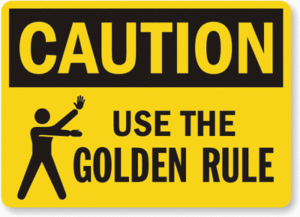I’m fortunate enough to be a working writer. Even though I’m not always writing something that I love, I’d rather write toilet-paper packages than do anything else for a living. Truly.
I’ve written for many different media and many different types of companies. I’ve been a newspaper reporter and a magazine writer. I’ve written books and I’ve written for trade journals. And for the last several years, I’ve been a corporate writer, penning (or is it “keyboarding” these days?) everything from brochures to blogs. 
Although many people believe the contrary, as a journalist, I was trained to tell the truth. (Really.) I had to attribute and back up everything I said. Nothing was a fact unless I could find two corroborating sources.
Marketing is a different story. Of course, everyone knows that marketers embrace drama and hyperbole. People expect advertisers to overstate their claims. Although I’m fine with drama, there’s something else that bothers me. Well, it doesn’t just bother me. I believe it’s a monumental mistake.
The big error corporate America (and maybe other countries, but I don’t know for sure) makes is forgetting that we’re marketing to actual humans.
It’s so easy to sit in a conference room and brainstorm with your marketing department–and often sales, as well–and theorize about what customers want. We think up product names and buzzwords that are designed to communicate the excitement we think any rational person would feel about our products or services. We devise mission statements that are as thorough and well thought out as a legal treatise.
The problem is, we often do all this without remembering that we are communicating with people. People who are not us. People who have no idea what we do or why it’s different than anything else on the market. We consider our competitors to be companies that make products or services that have comparable features to ours, when, in fact, the most important competitor we face have is the choice to buy nothing at all. How do you compete with nothing? By remembering that you’re marketing to actual humans, that’s how.
On job interviews, I’ve often been asked what I see as the most important element in communicating with prospects or customers. I think people often regard my answer as a weird one, but it’s authentic. I tell them that it’s all about the love.
What I mean is that commerce and marketing are not inherently bad things. After all, advertising and marketing are often our main source of information about the products available in the marketplace. We actually rely on marketers to give us crucial information that will help us make good decisions. So when we forget that we’re communicating with actual humans, we miss a very important opportunity–to penetrate the awareness of busy people who may truly need what we’re selling.
Here’s a great example. American Standard’s mission statement is: “Be the best in the eyes of our customers, employees and shareholders.” So, what does the company do? It supplies air-conditioning systems, plumbing products, and automotive braking systems. Would you know this from their mission statement? Not bloody likely.
If you want to relate to actual humans, it’s important to speak to those you serve. If you’re American Standard, what’s so wrong with saying “Provide the best air-conditioning, plumbing, and automotive-braking systems in the world to our customers so we can provide the best value to our shareholders?” Tell me what you sell and why you think you think I should care.
In journalism school, my brilliant professor William Burrows used to tell us to keep our grandmothers in mind with every paragraph of every story we write. “If your grandmother can’t understand it, it’s too complicated,” he explained.
The same goes for marketing communication. Maybe you don’t have to picture your grandmother, if she’s not the target for your product, but you should picture the person who’s picking up that brochure you’re about to write. Have you answered their questions? Have you addressed their concerns? How do you know they’re actual concerns? Have you explained why your product or service is better than the competition (including the competition of buying nothing at all)? Have you used plain language, or the language of corporate groupthink?
In general, at the end of the day, extend the same compassion that you wish others would extend to you when you’re wading through the universe of available products out there. Speak to me as you want to be spoken to. One human to another.
Because at the end of the day, it’s all about the love, baby. If you don’t let your customer know you love them, you’ll lose them to someone else who does.